Unit6Whenwasitinvented学习知识重点汇总整编
- 格式:doc
- 大小:115.12 KB
- 文档页数:12
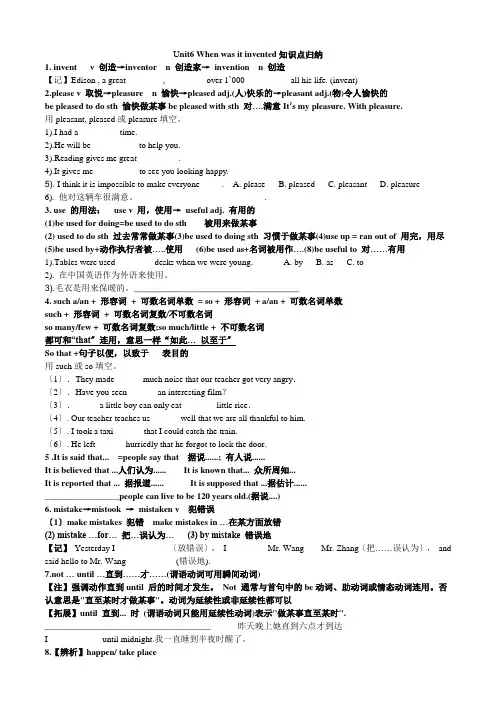
U nit6 When was it invented知识点归纳1. invent v 创造→inventor n 创造家→invention n 创造【记】Edison , a great ________, _________over 1’000__________ all his life. (invent)2.please v 取悦→pleasure n 愉快→pleased adj.(人)快乐的→pleasant adj.(物)令人愉快的be pleased to do sth 愉快做某事be pleased with sth 对….满意It’s my pleasure. With pleasure.用pleasant, pleased或pleasure填空。
1).I had a_________ time.2).He will be __________ to help you.3).Reading gives me great _________.4).It gives me __________to see you looking happy.5). I think it is impossible to make everyone_____. A. please B. pleased C. pleasant D. pleasure6). 他对这辆车很满意。
_____________________________.3. use 的用法:use v 用,使用→useful adj. 有用的(1)be used for doing=be used to do sth 被用来做某事(2) used to do sth 过去常常做某事(3)be used to doing sth 习惯于做某事(4)use up = ran out of 用完,用尽(5)be used by+动作执行者被…..使用(6)be used as+名词被用作….(8)be useful to 对……有用1).Tables were used ________ desks when we were young. A. by B. as C. to2). 在中国英语作为外语来使用。
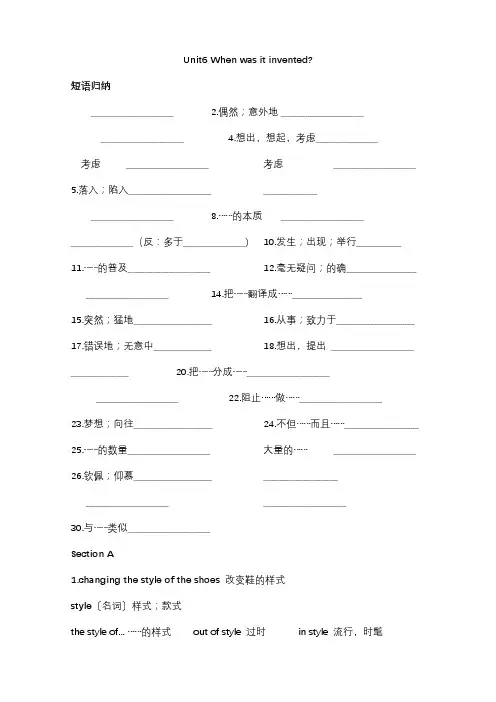
Unit6 When was it invented?短语归纳____________________ 2.偶然;意外地 ________________________________________ 4.想出,想起,考虑_______________考虑____________________ 考虑____________________ 5.落入;陷入____________________ _________________________________ 8.……的本质___________________________________(反:多于_______________) 10.发生;出现;举行___________ 11.……的普及____________________ 12.毫无疑问;的确_____________________________________ 14.把……翻译成……_________________15.突然;猛地___________________ 16.从事;致力于___________________ 17.错误地;无意中______________ 18.想出,提出____________________ ______________ 20.把……分成……________________________________________ 22.阻止……做……____________________23.梦想;向往___________________ 24.不但……而且……__________________25.……的数量____________________ 大量的……____________________26.钦佩;仰慕___________________ ______________________________________ ____________________30.与……类似____________________Section A1.changing the style of the shoes改变鞋的样式style〔名词〕样式;款式the style of... ……的样式out of style 过时in style 流行,时髦The style of the blouse is my mother's favorite.2.—Can you help me think of an invention?你能帮我想个发明吗?—With pleasure!乐意效劳!1) Can you do...?你能做……吗?此句型表示客气地请求某人做某事,其肯定回答一般为“Sure, I'd love/like to./With pleasure.”。
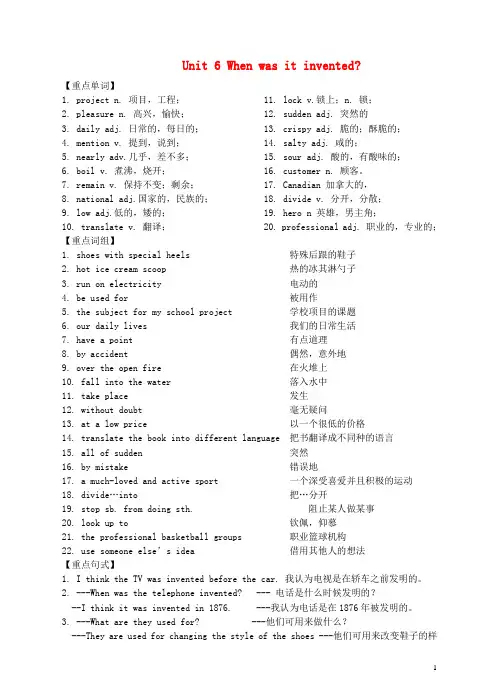
Unit 6 When was it invented? 【重点单词】1. project n. 项目,工程;2. pleasure n. 高兴,愉快;3. daily adj. 日常的,每日的;4. mention v. 提到,说到;5. nearly adv.几乎,差不多;6. boil v. 煮沸,烧开;7. remain v. 保持不变;剩余;8. national adj.国家的,民族的;9. low adj.低的,矮的;10. translate v. 翻译;11. lock v.锁上;n. 锁;12. sudden adj. 突然的13. crispy adj. 脆的;酥脆的;14. salty adj. 咸的;15. sour adj. 酸的,有酸味的;16. customer n. 顾客。
17. Canadian 加拿大的,18. divide v. 分开,分散;19. hero n 英雄,男主角;20. professional adj. 职业的,专业的;【重点词组】1. shoes with special heels 特殊后跟的鞋子2. hot ice cream scoop 热的冰其淋勺子3. run on electricity 电动的4. be used for 被用作5. the subject for my school project 学校项目的课题6. our daily lives 我们的日常生活7. have a point 有点道理8. by accident 偶然,意外地9. over the open fire 在火堆上10. fall into the water 落入水中11. take place 发生12. without doubt 毫无疑问13. at a low price 以一个很低的价格14. translate the book into different language 把书翻译成不同种的语言15. all of sudden 突然16. by mistake 错误地17. a much-loved and active sport 一个深受喜爱并且积极的运动18. divide…into 把…分开19. stop sb. from doing sth. 阻止某人做某事20. look up to 钦佩,仰慕21. the professional basketball groups 职业篮球机构22. use someone else’s idea 借用其他人的想法【重点句式】1. I think the TV was invented before the car. 我认为电视是在轿车之前发明的。
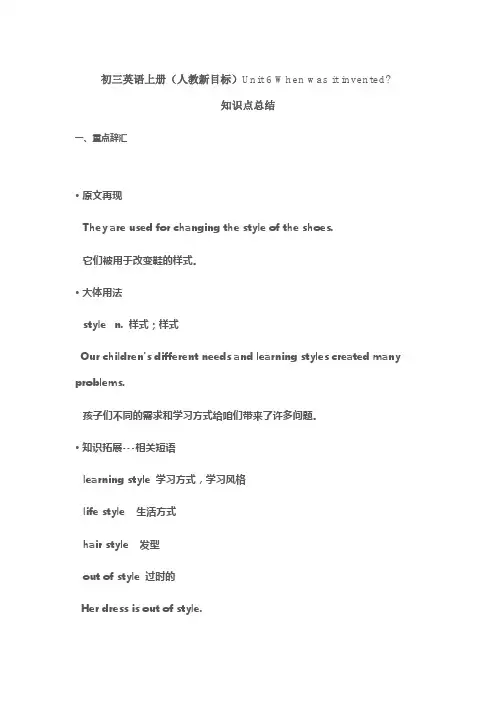
初三英语上册(人教新目标)Unit 6 When was it invented?知识点总结一、重点辞汇·原文再现They are used for changing the style of the shoes.它们被用于改变鞋的样式。
·大体用法style n. 样式;样式Our children's different needs and learning styles created many problems.孩子们不同的需求和学习方式给咱们带来了许多问题。
·知识拓展---相关短语learning style 学习方式,学习风格life style 生活方式hair style 发型out of style 过时的Her dress is out of style.她的穿着不时兴。
·原文再现The subject for my school project is "Small inventions that changed the world."学校课题的题目是:改变世界的小发明“·大体用法project n. 项目;工程Project Hope 希望工程The project will create up to 40 new jobs.这项工程将提供40个新的工作职位。
·知识拓展---其他词性project v. 计划(plan)The next edition of the book is projected for publication in March.本书的下一版计划于三月发行。
·原文再现--Can you help me think of an invention?你能帮忙我想一个发明吗?--My pleasure!我很荣幸。
·大体用法pleasure n. 高兴;愉快Watching sport gave him great pleasure.观看体育比赛给他以极大的愉悦。
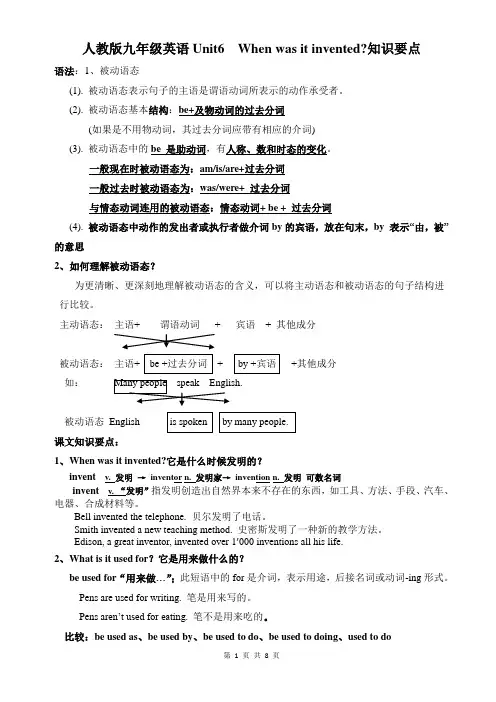
人教版九年级英语Unit6 When was it invented?知识要点语法:1、被动语态(1). 被动语态表示句子的主语是谓语动词所表示的动作承受者。
(2). 被动语态基本结构:be+及物动词的过去分词(如果是不用物动词,其过去分词应带有相应的介词)(3). 被动语态中的be 是助动词,有人称、数和时态的变化。
一般现在时被动语态为:am/is/are+过去分词一般过去时被动语态为:was/were+ 过去分词与情态动词连用的被动语态:情态动词+ be + 过去分词(4). 被动语态中动作的发出者或执行者做介词by的宾语,放在句末,by 表示“由,被”的意思2、如何理解被动语态?为更清晰、更深刻地理解被动语态的含义,可以将主动语态和被动语态的句子结构进行比较。
主动语态:主语+ 谓语动词+ 宾语+ 其他成分被动语态:主语+ be +过去分词+ by +宾语+其他成分如:被动语态English is spoken by many people.课文知识要点:1、When was it invented?它是什么时候发明的?invent v. 发明→inventor n. 发明家→invention n. 发明可数名词invent v. “发明”指发明创造出自然界本来不存在的东西,如工具、方法、手段、汽车、电器、合成材料等。
Bell invented the telephone. 贝尔发明了电话。
Smith invented a new teaching method. 史密斯发明了一种新的教学方法。
Edison, a great inventor, invented over 1’000 inventions all his life.2、What is it used for?它是用来做什么的?be used for“用来做…”;此短语中的for是介词,表示用途,后接名词或动词-ing形式。
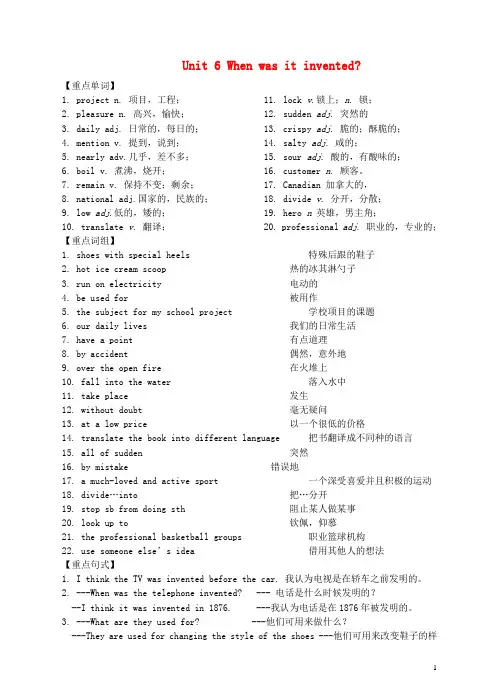
Unit 6 When was it invented? 【重点单词】1. project n. 项目,工程;2. pleasure n. 高兴,愉快;3. daily adj. 日常的,每日的;4. mention v. 提到,说到;5. nearly adv.几乎,差不多;6. boil v. 煮沸,烧开;7. remain v. 保持不变;剩余;8. national adj.国家的,民族的;9. low adj.低的,矮的;10. translate v.翻译;11. lock v.锁上;n. 锁;12. sudden adj. 突然的13. crispy adj. 脆的;酥脆的;14. salty adj.咸的;15. sour adj.酸的,有酸味的;16. customer n.顾客。
17. Canadian 加拿大的,18. divide v.分开,分散;19. hero n英雄,男主角;20. professional adj. 职业的,专业的;【重点词组】1. shoes with special heels 特殊后跟的鞋子2. hot ice cream scoop 热的冰其淋勺子3. run on electricity 电动的4. be used for 被用作5. the subject for my school project 学校项目的课题6. our daily lives 我们的日常生活7. have a point 有点道理8. by accident 偶然,意外地9. over the open fire 在火堆上10. fall into the water 落入水中11. take place 发生12. without doubt 毫无疑问13. at a low price 以一个很低的价格14. translate the book into different language 把书翻译成不同种的语言15. all of sudden 突然16. by mistake 错误地17. a much-loved and active sport 一个深受喜爱并且积极的运动18. divide…into 把…分开19. stop sb from doing sth 阻止某人做某事20. look up to 钦佩,仰慕21. the professional basketball groups 职业篮球机构22. use someone else’s idea 借用其他人的想法【重点句式】1. I think the TV was invented before the car. 我认为电视是在轿车之前发明的。
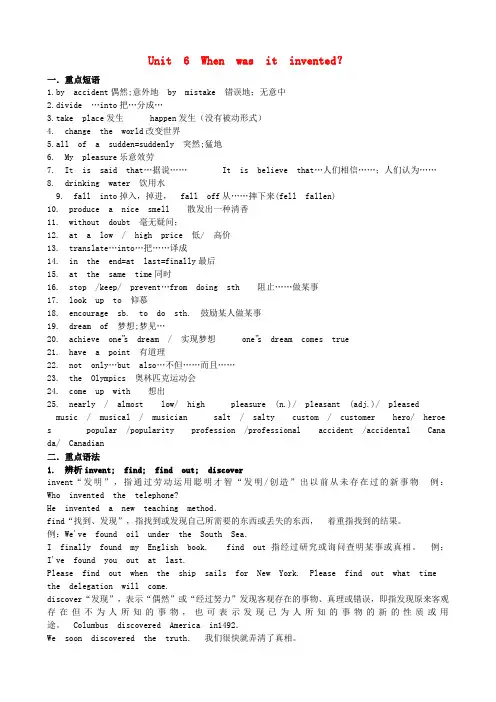
Unit 6 When was it invented?一.重点短语1.by accident偶然;意外地by mistake 错误地;无意中2.divide …into把…分成…3.take place发生happen发生(没有被动形式)4. change the world改变世界5.all of a sudden=suddenly 突然;猛地6. My pleasure乐意效劳7. It is said that…据说……It is believe that…人们相信……;人们认为……8. drinking water 饮用水9. fall into掉入,掉进,fall off从……摔下来(fell fallen)10. produce a nice smell 散发出一种清香11. without doubt 毫无疑问;12. at a low / high price 低/ 高价13. translate…into…把……译成14. in the end=at last=finally最后15. at the same time同时16. stop /keep/ prevent…from doing sth 阻止……做某事17. look up to 仰慕18. encourage sb. to do sth. 鼓励某人做某事19. dream of 梦想;梦见…20. achieve one‟s dream / 实现梦想one‟s dream comes true21. have a point 有道理22. not only…but also…不但……而且……23. the Olympics 奥林匹克运动会24. come up with 想出25. nearly / almost low/ high pleasure (n.)/ pleasant (adj.)/ pleasedmusic / musical / musician salt / salty custom / customer hero/ heroe s popular /popularity profession /professional accident /accidental Cana da/ Canadian二.重点语法1. 辨析invent; find; find out; discoverinvent“发明”,指通过劳动运用聪明才智“发明/创造”出以前从未存在过的新事物例:Who invented the telephone?He invented a new teaching method.find“找到、发现”,指找到或发现自己所需要的东西或丢失的东西,着重指找到的结果。
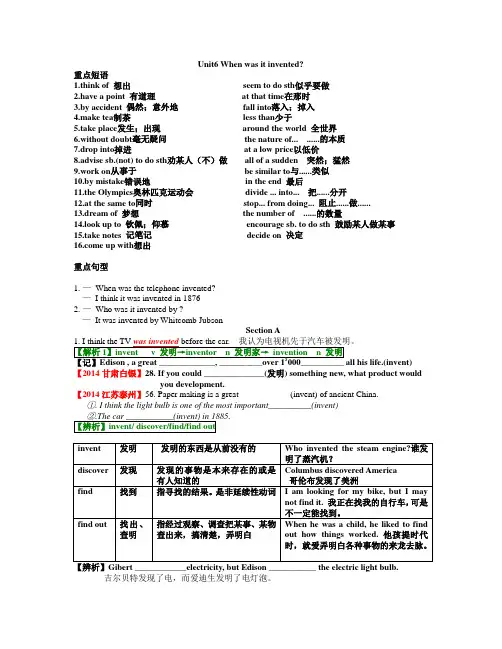
Unit6 When was it invented?重点短语1.think of 想出seem to do sth似乎要做2.have a point 有道理at that time在那时3.by accident 偶然;意外地fall into落入;掉入4.make tea制茶less than少于5.take place发生;出现around the world 全世界6.without doubt毫无疑问the nature of... ......的本质7.drop into掉进at a low price以低价8.advise sb.(not) to do sth劝某人(不)做all of a sudden 突然;猛然9.work on从事于be similar to与......类似10.by mistake错误地in the end 最后11.the Olympics奥林匹克运动会divide ... into... 把......分开12.at the same to同时stop... from doing... 阻止......做......13.dream of 梦想the number of ......的数量14.look up to 钦佩;仰慕encourage sb. to do sth 鼓励某人做某事15.take notes 记笔记decide on 决定e up with想出重点句型1.—When was the telephone invented?—I think it was invented in 18762.—Who was it invented by ?—It was invented by Whitcomb JubsonSection A1. I think the TV was invented before the car. 我认为电视机先于汽车被发明。
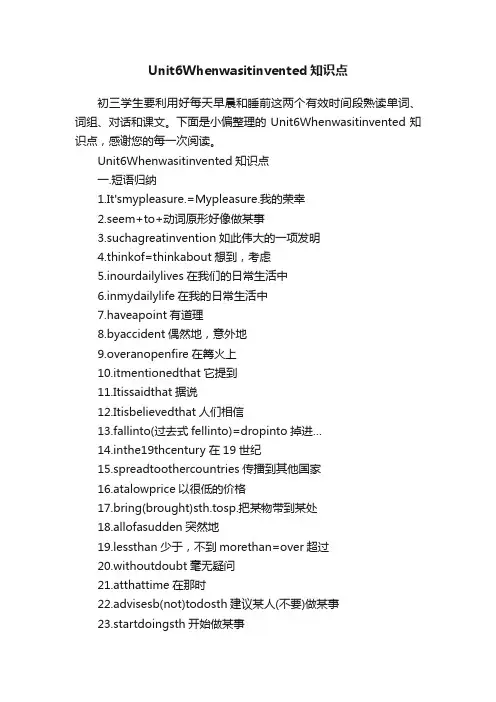
Unit6Whenwasitinvented知识点初三学生要利用好每天早晨和睡前这两个有效时间段熟读单词、词组、对话和课文。
下面是小偏整理的Unit6Whenwasitinvented知识点,感谢您的每一次阅读。
Unit6Whenwasitinvented知识点一.短语归纳1.It'smypleasure.=Mypleasure.我的荣幸2.seem+to+动词原形好像做某事3.suchagreatinvention如此伟大的一项发明4.thinkof=thinkabout想到,考虑5.inourdailylives在我们的日常生活中6.inmydailylife在我的日常生活中7.haveapoint有道理8.byaccident偶然地,意外地9.overanopenfire在篝火上10.itmentionedthat它提到11.Itissaidthat据说12.Itisbelievedthat人们相信13.fallinto(过去式fellinto)=dropinto掉进…14.inthe19thcentury在19世纪15.spreadtoothercountries传播到其他国家16.atalowprice以很低的价格17.bring(brought)sth.tosp.把某物带到某处18.allofasudden突然地19.lessthan少于,不到morethan=over超过20.withoutdoubt毫无疑问21.atthattime在那时22.advisesb(not)todosth建议某人(不要)做某事23.startdoingsth开始做某事24.workonsth致力于某事25.(be)similarto与……相似26.theOlympics奥运会27.bymistake错误地,无意地28.makeamistake犯错29.divide...into…把…分成…30.intheend=atlast=finally最后31.atthesametime同时32.teach(taught)sbtodosth教某人做某事eupwith想出34.encouragesb.todosth.鼓励某人做某事35.thepurposeof……的目的36.stopsbfromdoingsth阻止某人做某事37.lookuptosb.钦佩某人38.lookuptheword查找单词39.worktogether一起工作40.Iwanttoachievemydream.我想实现梦41.Mydreamwillcometrue.我的梦想会实现42.workhard努力工作43.onahardfloor在坚硬的地板上44.leadto导致leader领导,引路人45.Don'tmentionit.不客气,不用谢46.translate...into....把…翻译成…47.beusedfordoingsth=beusedtodosth48.dreamofdoingsth梦想做某事二.用法集萃1.beusedtodo被用来做某事beusedas被用作…beusedbysb.被某人使用2.helpsbdosth.=helpsb.todosth.帮助某人做某事3.makeadecisiontodosth.=decidetodosth.决定做某事4.makesb.+adj.使某人怎么样makesbdosth使某人做某事bemadetodosth被使唤去做某事5..inthisway这样,用这种方式三语法全解1.sometime一段时间sometimes有时sometimes几次sometime某个时候2.oneoftheworld'sfavoritedrinks.世界最受欢迎的饮料之一.oneof…之一,后面的名词用复数(一般要加S),动词用单数(一般要加S);favorite,最喜欢的,前面要用“谁的”.3.thousand千hundred百million百万,当它们前面有数字的时候,它们本身不能加S,当它们后面有of的时候它们要加S,但前面的数字和后面的of不能同时存在。
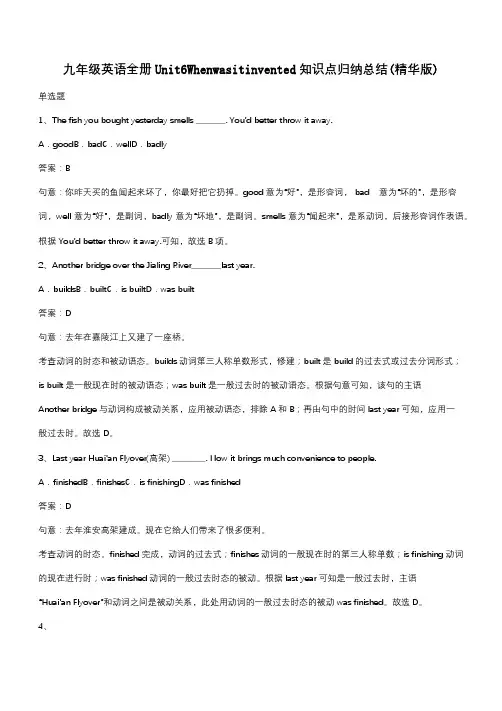
九年级英语全册Unit6Whenwasitinvented知识点归纳总结(精华版)单选题1、The fish you bought yesterday smells ________. You’d better throw it away. A.goodB.badC.wellD.badly答案:B句意:你昨天买的鱼闻起来坏了,你最好把它扔掉。
good意为“好”,是形容词, bad 意为“坏的”,是形容词,well意为“好”,是副词,badly意为“坏地”,是副词。
smells意为“闻起来”,是系动词,后接形容词作表语。
根据You’d better throw it away.可知,故选B项。
2、Another bridge over the Jialing River________last year.A.buildsB.builtC.is builtD.was built答案:D句意:去年在嘉陵江上又建了一座桥。
考查动词的时态和被动语态。
builds动词第三人称单数形式,修建;built是build的过去式或过去分词形式;is built是一般现在时的被动语态;was built是一般过去时的被动语态。
根据句意可知,该句的主语Another bridge与动词构成被动关系,应用被动语态,排除A和B;再由句中的时间last year可知,应用一般过去时。
故选D。
3、Last year Huai'an Flyover(高架) _________. Now it brings much convenience to people. A.finishedB.finishesC.is finishingD.was finished答案:D句意:去年淮安高架建成。
现在它给人们带来了很多便利。
考查动词的时态。
finished完成,动词的过去式;finishes动词的一般现在时的第三人称单数;is finishing动词的现在进行时;was finished动词的一般过去时态的被动。
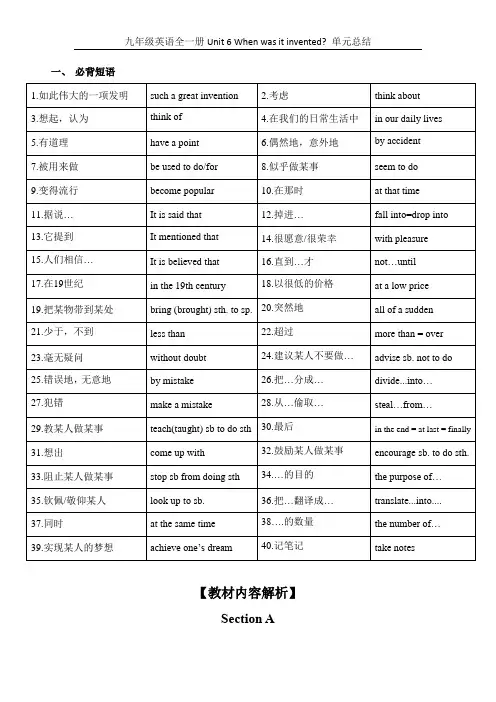
一、必背短语【教材内容解析】Section A1.I think the TV was invented before the car. (P. 41)invent用作及物动词,意为“发明、创造”,指创造出以前不存在的东西,invention 表示“发明物”;inventor表示“发明家”。
Edison invented the electric bulb.2.changing the style of the shoes (P. 42)style用作名词,表示“样式、款式”,in style表示“流行、时髦”,out of style表示“过时”。
I like different styles of clothes.Long shirts are black in style.3.With pleasure! (P. 42)with pleasure则表示“很乐意去做某事”,强调事情还没有去做,但是表达愿意效劳的意愿。
It’s a pleasure/It’s my pleasure/My pleasure表示“不客气、很乐意效劳”,常用来回答Thank you或者对效劳过的事情表示没什么,很乐意去做。
---Would you please take care of my dog while I am away.---With pleasure.---Thank you for taking care of my dog while I am away.---My pleasure.4.Is it really such a great invention? (P. 42)“such+a/an+adj.+n.”表示“如此……的……”,相当于“so+adj.+a/an+n.”。
I have never read such an interesting book.=I have never read so interesting a book.5.Think about how often it’s used in our daily lives.(P. 42)daily作形容词,表示“每日的、日常的”,相当于everyday。
Unit 6 When was it invented?【知识点整理】1. 被动语态(1)被动语态表示句子的主语是谓语动词所表示的动作承受者。
(2)被动语态基本结构:be+及物动词的过去分词(如果是不及物动词,其过去分词应带有相应的介词)(3)被动语态中的be 是助动词,有人称、数和时态的变化。
一般现在时的被动语态为:am/is/are+过去分词一般过去时的被动语态为:was/were+ 过去分词与情态动词连用的被动语态:情态动词+ be + 过去分词(4)被动语态中动作的发出者或执行者做介词by的宾语,放在句末,by 表示“由,被”的意思,如何理解被动语态?主动语态:主语+谓语动词+宾语+其他成分被动语态:主语+be+过去分词+by+宾语+其他成分如:Many people speak English.English is spoken by many people.3. invent v. 发明 inventor n. 发明家 invention n. 发明,可数名词4. be used for doing ,用来做…(是被动语态)Pens are used for writing. 笔是用来写的。
5. 给某人某样东西 give sth. to sb. I gave a pen to him. 我给他一支笔。
give sb. sth. I gave him a pen. 我给他一支笔。
6. all day 整天7. salty adj. 咸的 salt n. 盐8. by mistake 错误地(犯错是:make mistake,这些常见的短语大家务必要掌握)I took the umbrella by mistake. 我不小心拿错了雨伞。
9. make sb./sth+形容词:使…怎么样 It made me happy. 它使我高兴make sb./sth+名词:让…做… It made me laugh. 它让我发笑10. by accident 意外,偶然(常见短语,考的最多的是它的意思)I met her by accident at bus stop. 我在公共汽车站意外地见到了她。
一、必背短语【教材内容解析】Section A1.I think the TV was invented before the car. (P. 41)invent用作及物动词,意为“发明、创造”,指创造出以前不存在的东西,invention 表示“发明物”;inventor表示“发明家”。
Edison invented the electric bulb.2.changing the style of the shoes (P. 42)style用作名词,表示“样式、款式”,in style表示“流行、时髦”,out of style表示“过时”。
I like different styles of clothes.Long shirts are black in style.3.With pleasure! (P. 42)with pleasure则表示“很乐意去做某事”,强调事情还没有去做,但是表达愿意效劳的意愿。
It’s a pleasure/It’s my pleasure/My pleasure表示“不客气、很乐意效劳”,常用来回答Thank you或者对效劳过的事情表示没什么,很乐意去做。
---Would you please take care of my dog while I am away.---With pleasure.---Thank you for taking care of my dog while I am away.---My pleasure.4.Is it really such a great invention? (P. 42)“such+a/an+adj.+n.”表示“如此……的……”,相当于“so+adj.+a/an+n.”。
I have never read such an interesting book.=I have never read so interesting a book.5.Think about how often it’s used in our daily lives.(P. 42)daily作形容词,表示“每日的、日常的”,相当于everyday。
Unit6 When was it invented 知识点归纳Unit 6: When Was It Invented。
Knowledge Points1.To invent means to create something new。
and the person who does this is called an inventor。
The result of this process is called an n。
For example。
Edison was a great inventor who created over 1,000 XXX.2.Please is a verb that means to make someone happy or satisfied。
The noun form of this word is pleasure。
and the adjective form can be either pleased (used to describe a person who is happy) or pleasant (used to describe something that is enjoyable)。
You can use these words in different ways。
such as saying "I had a pleasant time" or "He will be pleased to help you." Reading gives me great pleasure。
and it gives me pleasure to see you looking happy。
The correct answer to the n "I think it is impossible to make everyone _____" is pleased.3.The verb use means to utilize or employ something。
1人教版英语九年级单元重点知识Unit 6 When was it invented?.2基础夯实【重点单词短语过关】读一读背一背nearly adv. 几乎;差不多ruler n. 统治者,支配着boil v. 煮沸;烧开remain v.保持不变;剩余smell n. 气味v. 发出气味;闻到saint n. 圣人;圣徒doubt n. 疑惑;疑问 v. 怀疑fridge n. 冰箱lock v. 锁上;锁住earthquake n. 地震heel n. 鞋跟;足跟electricity n. 电;电能scoop n. 勺; 铲子style n. 样式; 款式project n. 项目;工程pleasure n. 高兴;愉快zipper n. (= zip) 拉链;拉锁daily adj. 每日的;日常的website n. 网站translate v. 翻译3基础夯实【重点单词短语过关】读一读背一背sudden adj. 突然(的)biscuit n. 饼干cookie n. 曲奇饼干instrument n. 器械; 仪器;工具crispy adj. 脆的;酥脆的sour adj. 酸的;有酸味的customer n. 顾客;客户Canadian adj. /n .加拿大/人的divide v. 分开;分散purpose n. 目的;目标basket n. 篮;筐the Olympics 奥林匹克运动会look up to 钦佩; hero n. 英雄;男主角pioneer n. 先锋;先驱list v. 列表;列清单n. 名单;清单mention v. 提到;说到accidental adj.意外的;偶然的4基础夯实【重点单词短语过关】读一读背一背It's my pleasure.= My pleasure.我的荣幸think of = think about想想,考虑have a point有道理take place 发生;出现without doubt 毫无疑问;的确all of a sudden 突然; 猛地by mistake 错误地;无意中make a mistake 犯错in the end= at last = finally最后at the same time 同时divide ... into 把⋯分开by accident 偶然;意外地It is said that... 据说It is believed that ...人们相信fall into = drop into掉进less than 少于more than = over 超过at that time 在那时work on sth 致力于某事be similar to 与...相似5基础夯实【单元目标语句回顾】读一读练一练--I think the TV was invented before the car.--When was the telephone invented?--I think it was invented in 1876.--What are they used for?--They’re used for seeing in the dark.--Who was it invented by?--It was invented by Whitcomb Judson.--When was tea brought to Korea?--It was brought to Korea during the 6th and 7th centuries.--What is the hot ice-cream scoop used for?--It’s used for serving really cold ice-cream.--Did you know potato chips were invented by mistake?6重点词句精讲1. invent 用法invent v. 发明,名词形式为:invention意为“发明”。
Unit 6 When was it invented?语法一般过去时的被动语态1.一般过去时的标志词last week上周last month上个月last year去年last night 昨天晚上three years ago三年前three months ago三个月前three weeks ago三周前in the morning在早上yesterday昨天the day before yesterday前天just now刚才the other day前几天on those days在那些日子里2.一般过去时分为主动语态和被动语态:3.一般过去时主动语态的构成:一般过去时主动语态可以分成两类:一类是带be的,另一类是带实义动词的。
带be的各种句式的构成(1)肯定句的构成是:主语+ was/were +其他(2)否定句的构成是:主语+was/were + not +其他(3)一般疑问句的构成是:Was/Were+主语+其他?肯定回答是:Yes,主语+was/were否定回答是:No,主语+was/were +not(4)特殊疑问句的构成是:疑问词+ was/were+主语+其他?带实义动词的各种句式的构成(1)肯定句的构成是:主语+ 动词过去式+其他My father made the desk yesterday.(2)否定句的构成是:主语+ didn’t +动词原形+其他My father didn’t make the desk yesterday.(3)一般疑问句的构成是:Did +主语+动词原形+其他?Did you father make the desk yesterday? Yes,he did.No,he didn’t.肯定回答是:Yes,主语+did.否定回答是:No,主语+didn’t(4)特殊疑问句的构成是:疑问词+ did +主语+动词原形+其他??My father made the desk yesterday. When did your father make the desk?5.一般过去时被动语态的构成:主语+was/were+动词过去分词+by短语+其他The house was built in 1967.(1)否定句的构成是: 主语+was/were+not+动词过去分词+by短语+其他The house was not built in 1967.(2)一般疑问句的构成是: Was/Were+主语+动词过去分词+by短语+其他Was the house built in 1967? Yes,it was.No,it wasn’t.肯定回答是:Yes,主语+was/were否定回答是:No,主语+was/were +not(3)特殊疑问句的构成是:疑问词+was/were+主语+动词过去分词+by短语+其他The house was built in 1967. When was the house built?(1)My brother broke a bowl last night.(改为被动语态)A bowl by my brother last night.(2)Every year the organization collects money to help the old people.(改为被动语态)Every year money by the organization to help the old people.(3)We call math the language of science.Math the language of science.(4)Did Tom work out this problem? (改为被动语态)this problem by Tom?(5)One of the classrooms was often cleaned.(改为否定句)One of the classrooms often .(6)—Did you win the basketball game?—Bad luck,our team in the final one..A.wonB.beatC.was wonD.was beaten(7) This kind of bike in Suzhou in 2011.A. was madeB. madeC.was makingD. makes(8)___________ tea plants grown in Hangzhou?A. DoB. DidC. WasD. Were(9)The doctor looked over Peter carefully after he to the hospital.A. takesB.is takenC.tookD.was taken(10)The bridge_____ by the local people in 2000.A.builtB.was builtC.buildD.was buildSection A1.invent动词,意为“发明” inventor名词,意为“发明家”invention 可数名词,意为“发明”Edison invented the electric light.Edison was a great inventor. The telephone is a useful invention.Edison was a great .He over 1,000 during his life.A.invent;invented;inventionsB.inventor;invented;inventionC.inventor;invented;inventionsD.inventor;invents;inventions2.区分invent 和discover(1)invent指客观上不存在的东西后来被人发明(2)discover意为“发现,找到”,指发现或找到某种自然界本来已存在,但以前未被人发现或认识的事物。
Edison invented the electric light.Columbus discovered America on the 12th of October, 1492.(1)We all know who the telephone.A.findB.foundC.discoveredD.invented(2)Gilbert(吉尔伯特) electricity and Edison the electric light bulb.A.discovered;inventedB.discovered;discoveredC.invented;inventedD.invented;discovered3.with介词,意为“有;带有;具有”,表示某物带有或具有某种特征。
a coat with four pockets. a house with a garden.一个带有花园的房子。
—Would you like some coffee,please?—Yes,and please get some sugar.I prefer coffee sugar.A.toB.forC.withD.from4.提建议的表达方法及应答(1)What/How about doing sth?意为“做某事怎么样?”What about going fishing with me this afternoon?(2)Why don’t you do sth?或Why not do sth?意为“你为什么不做某事呢?”Why don’t you buy your mother some flowers?=Why not buy your mother some flowers?(3)Let’s do sth意为“让我们做某事吧!”Let’s go to school by bike.(4)Shall we do…?意为“我们去做……好吗?”Shall we go to the park on Sunday?(5)You’d better do sth./You’d better not do sth.意为“你最好做某事/你最好不要做某事。
”It’s cold outside.You’d better put on your coat.(6)You should do sth.意为“你应该做某事”You shouldn’t do sth.意为“你不应该做某事”You should go to bed early.(1)肯定回答①Good idea.好主意②That sounds great.听起来好极了(2)否定回答①Sorry,I…; ②I’m afraid I can’t(1)—I feel a bit hungry now.—Why not for dinner with us?A. goB. Did you goC.to goD. do you go(2)—It’s a fine day today.Shall we go swimming?—But we need to be home befo re six o’clock.A. Have a nice time!B. Not at all.C.You are right.D. Good idea!(3)Why don’t you buy your mother a scarf for her birthday?(改为同义句)Why your mother a scarf for her birthday?(4)Shall we have a picnic at the weekend? (改为同义句)having a picnic at the weekend?(5)—We’ll go to Qing Yuan Mountain tomorrow.Why join us?—That’s a good idea.A. notB. don’tC.can’tD. didn’t5. Would you like sth?用于委婉的提出建议,或征求对方意见。
肯定答语:Yes, please. 否定答语:No, thanks.—Would you like some tea? —Yes, please. /No, thanks.6.Would you like to do sth?用于委婉的提出建议,或征求对方意见。